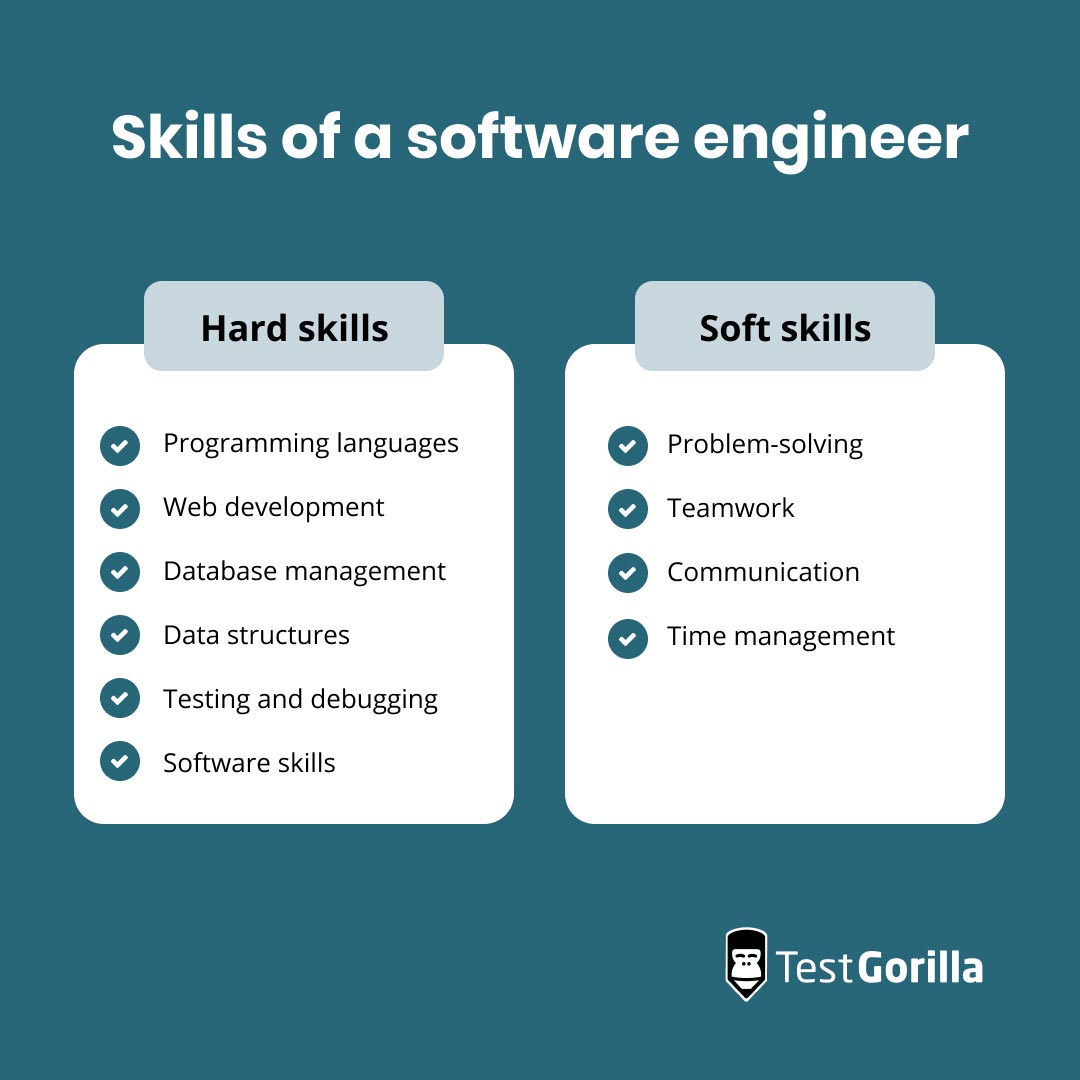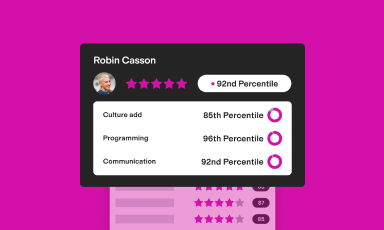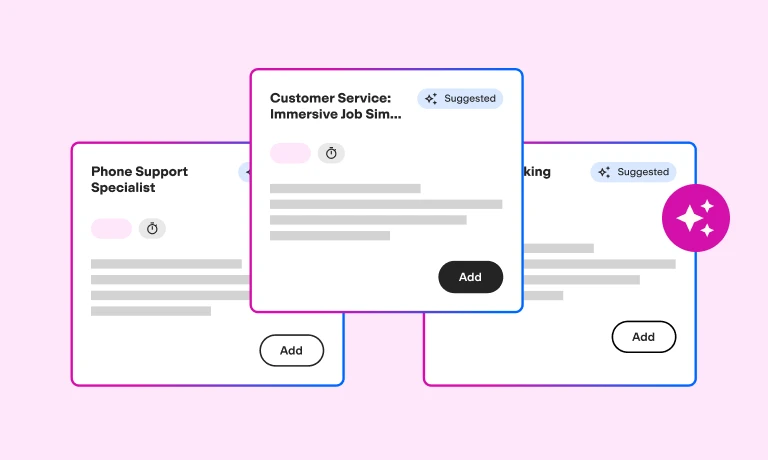Software engineers are some of the highest-earning employees of an organization. And why shouldn't they be? Any application, software, or website we use is designed and developed by teams of software engineers.
Whether you're a business owner, a startup founder, the hiring manager of a big enterprise, or just looking to build and promote an app, you should know how to hire a software engineer to get the best results. And for this, having the right skills assessment tools is essential.
In this article, we'll discuss how to hire a software engineer for your business, what they do exactly, and what skills you should look for.
We'll also see how skills-based assessments can streamline your software engineer hiring process and help you make the right hiring decision.
Table of contents
- What is a software engineer?
- Hard skills of a software engineer
- Soft skills of a software engineer
- How to test software engineer skills
- Software engineer interview questions
- Where to find a software engineer
- How much does a software engineer cost
- Software engineer job description template
- Hire the best software engineers without bias
What is a software engineer?
Software engineering is the branch of computer science related to designing, developing, testing, and maintaining software applications.
Software engineers are highly skilled professionals who build software solutions. They possess a deep understanding of engineering principles and programming languages, which enables them to write the hundreds and thousands of lines of code that make the software run.
Software engineers are responsible for turning concepts and ideas into tangible products and have the ability to decide which programming language, platform, data structure, and design principle to use.
The role of a software engineer is of immense importance within a company. They drive the technological innovation that keeps the company competitive and design user-friendly interfaces for enhanced customer experience.
Software engineers vs software developers: What’s the difference?
The terms “software engineer” and “software developer” are often used interchangeably, but they’re not exactly the same.
Software engineers typically have a broader scope of responsibilities, including system architecture, design, testing, quality assurance, and more. For this, they need to use and build systems and processes, similarly to engineers in other fields, and make high-level decisions that might impact the entire application.
Software developers, on the other hand, are mostly focused on the actual development of software.
In many countries, software engineers also need to have formal engineering education, while software developers might come from a number of different backgrounds.
Whether you need to hire a software developer, a software engineer, or a software engineering manager to take charge will depend on the scope and complexity of the project.
Hard skills of a software engineer
Software engineers need several technical skills to ensure they can contribute to the work of development teams by writing high-quality code, optimizing existing solutions, and addressing bugs and inefficiencies.
Hard skills they need include proficiency in the programming languages and development tools your company is using, along with a solid understanding of algorithms, object-oriented programming, and database management.
Programming languages
The most fundamental skill for a software engineer is their proficiency in different programming languages. They must be able to write code in languages such as Python, Java, C++, Ruby, or JavaScript, among others.
The choice of programming languages will depend on the requirements of the project, but software engineers should always be willing to expand their knowledge or learn a new language if needed.
Web development
Software engineers might frequently work on building websites and web applications, as well. For this, they need to be well-versed in HTML, CSS, and Front-end frameworks like React and Angular, which would enable them to create interactive and user-friendly sites.
They must also have a strong grasp of backend technologies like Django, Node.js, and Ruby on Rails to be able to understand the logic and the necessary functionalities of each application and create a robust backend system.
Database management
Any software engineer must be familiar with the different types of databases and how they're used for efficient data storage and retrieval.
For this, they should be proficient in SQL and be familiar with relational databases like MySQL and PostgreSQL. They should also be familiar with NoSQL databases like MongoDB for handling large volumes of unstructured or semi-structured data.
Data structures
In-depth knowledge of linear and non-linear data structures like arrays, stacks, linked lists, trees, graphs, and queues is essential for skilled software engineers.
It helps them organize and manipulate data effectively; thanks to their understanding the strengths and weaknesses of different data structures, engineers can choose the right ones for the task at hand.
For a comprehensive evaluation of a candidate's knowledge, consider a dedicated Algorithms for Software Engineering test.
Testing and debugging
Two of the most important processes in the software development life cycle are testing and debugging.
Software engineer should be proficient in testing frameworks and debugging tools to be able to identify and resolve issues in the code. They should know how to:
Write individual tests for discrete code components
Test interactions between different components
Conduct systematic debugging
Software skills
While proficiency in programming languages is a must, software engineers should also know how to use different software tools to write, compile, test, and run codes.
They also need to be familiar with issue-tracking systems, timesheets, and different enterprise solutions of Microsoft, Google, AWS, and other providers.
The best insights on HR and recruitment, delivered to your inbox.
Biweekly updates. No spam. Unsubscribe any time.
Soft skills of a software engineer
Software development is not all about technical skills, though – software engineers most often work in teams and need several soft skills to be successful.
Problem-solving
One of the most important responsibilities of software engineers is to understand the product or design team's requirements, analyze complex issues, break them down into manageable parts, and devise logical solutions.
Strong problem-solving skills enable them to use the available resources efficiently and think outside the box to come up with innovative solutions to complex issues.
Teamwork
Software engineers often collaborate with traditional or cross-functional teams to achieve common goals. They also need to be able to manage disagreements constructively and find compromises to maintain a harmonious work environment.
Communication
Skilled software engineers are able to present technical concepts to non-technical stakeholders clearly and comprehensively. They actively engage in conversations, express ideas, understand others' perspectives, and ensure that everyone is on the same page.
Since they work in a team, software engineers must have excellent documentation skills as well, to help them understand and describe code, processes, and decisions.
Time management
Consistently delivering work on time and ensuring projects advance as scheduled is a crucial skill for any software engineer.
They should be able to accurately estimate the time required to complete tasks and prioritize them effectively based on their importance and deadlines. This enables them to allocate resources and plan projects efficiently.
How to test software engineer skills
A resume gives you an idea of the candidate's past experience and their educational qualifications. An interview will help you to assess their knowledge, ability to come up with solutions on the go, and how well they can communicate.
None of these, however, give you a complete picture of the candidate's skills and technical prowess.
Software engineering is a field where recent graduates often compete with experienced professionals who hold degrees from prestigious colleges and have been in the field for years.
This is why you must evaluate every candidate on the same scale and provide them with an equal opportunity to succeed.
TestGorilla’s pre-employment tests are ideal for this, because they enable you to evaluate every applicant’s skills objectively and without bias – and invite the best candidates to an interview. You can even combine up to five tests of your choice to create a customized assessment.
Some of the tests that you can use to hire your next software engineer are:
Software engineering: This test enables you to assess candidates’ knowledge of the basic principles of software engineering, so it’s an obvious choice for the role.
Programming languages: Depending on the tech stack that your development team uses, you can evaluate candidates’ proficiency in Python, C++, Ruby, JavaScript, CSS, and other languages.
Clean Code: Check engineers’ ability to write easy-to-maintain code so that they get it right the first time instead of writing hundreds of lines of code.
Communication: Evaluate whether candidates are able to communicate professionally, collaborate with their team members, and use active listening to understand your requirements.
Problem-solving: Software development means unexpected bugs and issues crop up all the time. Assess applicants’ ability to solve those challenges with this test.
Time management: Use this test to check whether your candidates know how to prioritize tasks and stick to project timelines.
Software engineer interview questions
Once you assess your applicants’ skills with the help of skills tests, it’s time to invite the best ones to an interview for a more in-depth evaluation of their qualities and experience.
Here are some sample interview questions you can ask candidates to find the perfect fit for the role:
What are your favorite programming languages and why?
How do you handle code reviews, both as the reviewer and the one being reviewed?
How do you ensure and maintain high code quality in large and complex projects?
What are some of the differences between relational databases and NoSQL databases?
What are microservices and what are their benefits and downsides?
How do you ensure that the applications you develop are secure?
Describe the most challenging project you've worked on. What was your role, and what was the outcome?
A piece of software you developed is causing production issues. How would you handle that?
Can you explain the difference between a class and an object?
How would you handle a situation where the project requirements aren't clear?
What are containers and how are they used in software development?
How do you stay motivated when working on repetitive, boring tasks?
If you need more ideas, we’ve prepared a detailed selection of interview questions for software engineers and another one for senior software engineers.
To this, you can add programming-skills interview questions to gain a deeper understanding of your candidates’ technical abilities. You can also use our Jenkins interview questions to assess applicants’ proficiency in Jenkins.
Where to find a software engineer
There are more than 1.6 million software developers and quality assurance employees in the USA alone, selecting the best one can be daunting. So, knowing where to look is essential – as is knowing whether you should hire a full-time employee or a freelancer.
In-house software engineers
You can hire dedicated in-house developers through professional job boards and career websites like LinkedIn and Indeed.
Campus recruitment is also a great strategy you can use to hire recent graduates who have up-to-date knowledge and are eager to get their first professional experiences.
You can also team up with recruitment agencies specializing in the tech industry to identify great candidates. And, of course, referrals and recommendations are always available.
Pros:
There are several benefits to hiring full-time employees. In-house engineers are:
Fully committed to the company's goals and objectives
Always available for check-ins, meetings, and discussions
Familiar with the company's vision and mission
Motivated to actively contribute towards the growth of your business
Cons:
There are several downsides, too. Full-time employees:
Cost more due to salaries, benefits, and overhead expenses
Limit your flexibility to scale the team based on project needs
Might sometimes be unavailable or resign, which will inevitably affect project deadlines
Freelance software engineers
Independent contractors offer their services on freelance platforms like Upwork, Fiverr, or TopTal.
You can also contact software engineers who are looking for work on tech-specific job boards or coding communities like Stack Overflow, GitHub, HackerRank and more.
Pros:
Working with freelancers means you have:
More flexibility to hire on a project-by-project basis
Lower costs compared to full-time employees
The option to hire for short-term projects or one-time tasks
Cons:
On the other hand, if you hire independent contractors, you’ll:
Have no control over their work schedules and availability
Work with people who aren’t that committed to the company's goals and objectives
How much does a software engineer cost
The salary you should offer your next software engineer will depend on a number of factors, such as the candidate's experience, technical proficiency, as well as on your company’s location, size, and industry.
According to a report by Zippia, software engineers in the US earn $100,260 per year or $48.20 per hour on an average.
Average salaries range between $73,000 and $136,000, depending on the experience and location of the candidate.
Recent graduates tend to be on the lower end of the spectrum, while engineers with years of experience and a strong command of different programming languages earn the most.
Software engineers working in startups get paid the highest salaries in the industry, which is something you should take into consideration before making an offer.
Software engineer job description template
Position: Software engineer in [type of company or industry]
Location: [city, state]
[Your company name] is a leading [type of company and a brief description, f.e. “gaming studio with a passion for creating immersive and exciting games”].
We’re committed to [briefly describe your mission] and are looking for a talented software engineer to join our development team.
Responsibilities
As a part of our software development team, you will:
Build, design, develop, and optimize applications and their functionalities using [list a few of the programming languages your team is using]
Create systems and processes to facilitate software development
Collaborate with software architects, developers, project managers, and designers to bring application ideas to life
Debug and resolve technical issues to ensure applications’ perform optimally and in line with customers’ expectations
Integrate and optimize software infrastructure and data assets
Write clean, maintainable, and efficient code
Participate in code reviews, providing and receiving constructive feedback
Work closely with the QA team to identify and fix bugs
Collaborate with cross-functional teams to ensure the seamless deployment and delivery of applications
Requirements
For this role, you’ll need the following:
A bachelor's degree in Computer Science, Engineering, or related field
[X] years of software engineering experience in [industry]
Proficiency in [specific programming languages]
Experience with [specific frameworks or tools]
Strong problem-solving skills and attention to detail Ability to collaborate effectively in a team environment
Excellent communication skills, both written and verbal
Benefits
We offer you the opportunity to join a market leader in the [industry, sector] and also:
A base salary between [range], plus performance bonuses
Comprehensive health and dental benefits
Access to the latest software development tools and technologies
A comprehensive learning and development program and excellent career-growth opportunities
A collaborative and dynamic work environment
[Describe any other perks or benefits you offer]
How to apply
[Describe your application procedure here]
Hire the best software engineers without bias
Software engineers are among the most important employees of your organization. Depending on the project, their responsibilities can vary a lot. Plus, bad hires can be very expensive, and that's obviously not ideal.
To help you mitigate the risk of making the wrong hiring decision and streamline your software engineer recruitment process, we’ve designed hundreds of skills tests you can use to make objective and accurate hiring decisions.
Head on to our test library to select the tests that are the most relevant to your position; combine up to five tests in a single assessment and add custom questions for a more personalized assessment.
Sign up for a live demo of TestGorilla today and hire your next software engineer without bias or stress.
You've scrolled this far
Why not try TestGorilla for free, and see what happens when you put skills first.



















